On April 05 and 06, 2017, more than 180 participants flocked to London, UK, to take part in the international OER17 conference, under the motto of „The Politics of Open“. More than 70 workshops allowed for a thorough occupation with an amazing variety of approaches to the topic of ‘Openness’ and its twin theme of Open Educational Resources.
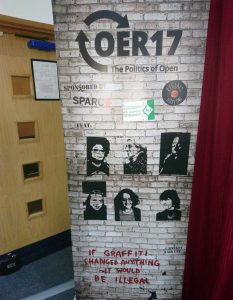
“OER17 conference banner” by Tobias Steiner, SynLLOER project, University of Hamburg is licensed under CC BY-SA 4.0
During those two days, four major thematic groups emerged: First of all, Openness (as concept or theme) became the focus of active critical engagement. The topics raised included larger questions about explicit and implicit power relations, asking “Who are the enablers of Openness, and who is not? (and why?)” and “Who, due to economic, technological, and/or sociocultural dependencies, is cut off from the ongoing developments towards Openness on the levels of production and/or reception?”. Several presentations also were highly topical, dealing with the election of Donald Trump, as well as the ongoing Brexit situation, and the effects these developments might have on debates around Openness.
A second point of focus highlighted the importance of Open Pedagogy. What was particularly highlighted within this context was the role of, as well as corresponding challenges arising from, teaching staff and multiplies that are seen as playing a crucial part in the larger process of opening education towards Open Educational Practices, while also keeping in mind questions of sustainability, accessibility and open access.
A third thematic group comprised a vast array of educational tools and infrastructures that are necessary to open up educational materials and scientific data and information on a larger scale. What seems notable (from a German perspective) was the overall acceptance of Wikipedia, Wikimedia and corresponding projects such as WikiSlides as a central hub of open information that can be made productive for both private uses as well as the academic sector.
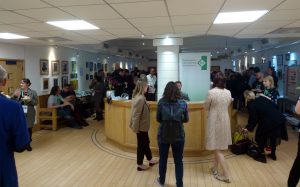
“OER17: break between sessions” by Tobias Steiner, SynLLOER project, University of Hamburg is licensed under CC BY-SA 4.0
Regarding the variety of participants, while many presenters were from the US and the UK, it is also notable that the overall geographic spread made OER17 a truly international event: case studies and keynotes from Ghana, Egypt, South Africa, Lebanon, Australia, India, and Sweden allowed for a global perspective on the conference theme of Openness. What this also made visible, was the spectrum of challenges that OER projects are facing, depending on each local context. Furthermore, it showed how creative projects were in finding solutions to these challenges – solutions that often worked, but also sometimes failed.
What I found very inspiring was the Openness that was also shown in relation to this process: in a constructive fashion, the organizers also included project examples that had ‘failed’ to master the challenges they were facing (due to a variety of reasons), and those examples were gratefully accepted by the conference participants as important information from which one might learn. One brilliant example: „How Wales Opened the Door to OER but didn’t walk through“).
Four German projects presented at OER17. The OER Information Hub introduced the audience to the Federal Ministry of Education and Research (BMBF)’s OERInfo line of funding labeled „Digital Media in professional education and training “ and referred about current state of affairs and ongoing activities.
The joint project „Multiplier support for Open Educational Resources in Lower Saxony (Multiplikator/innenunterstützung für Open Educational Resources in Niedersachsen) (MOIN)“ presented its cross-sectoral approach. Later on, the University of Duisburg-Essen provided insights into their plans to further develop the university’s digital strategy.
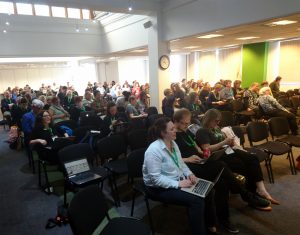
“OER17: The audience is listening.” by Tobias Steiner, SynLLOER project, University of Hamburg is licensed under CC BY-SA 4.0
And last, but not least, University of Hamburg’s SynLLOER project introduced the spread of activities that are currently taking place in the Hamburg metropolitan area towards a sustainable culture of Open Educational Practices.
All in all, the OER17 conference has been an amazing experience. Active discussion and networking was enabled via a broad variety of different ways of engagement – an engagement that really allowed for a widening of one’s own perspective.
The list provides links to conference-related material:
- SynLLOER presentation slides: https://uhh.de/synlloer-oer17
- timeline “Development of OER in Germany, from 1997 to 2017 (the last 20 years)”: https://uhh.de/synlloer-timeline-germany
- interactive timeline version: https://openlab.blogs.uni-hamburg.de/en/timeline-development-of-oer-in-germany/
- collection of OER17 resources (participants‘ blogs, slides, etc.) : https://uhh.de/synlloer-oer17resources
- Podcast (in German) by Christian Friedrich and Markus Deimann: [icon name=”soundcloud”] “Feierabendbier: Open Education – Episode 25: Rückblick #OER17”:
Header image source: “With Openness comes increased responsibility” – sketch by Bryan M Mathers (@bryanMMathers), under a CC-BY 4.0 licence.
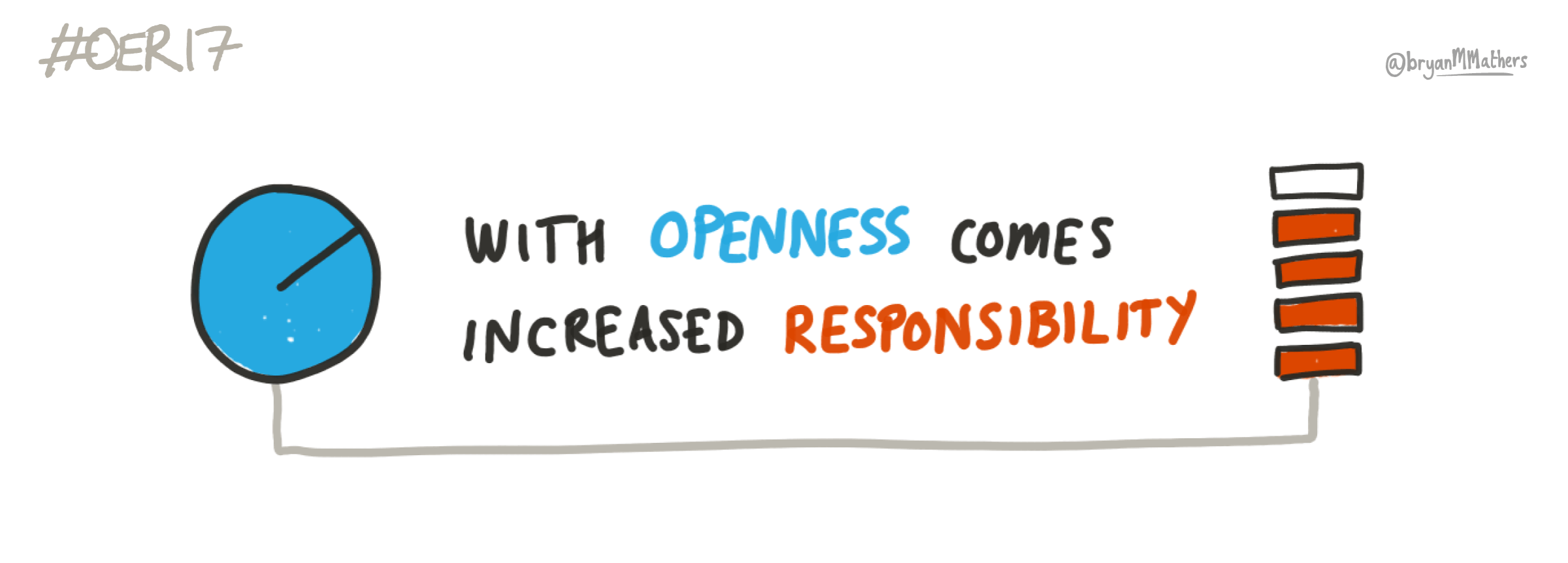

Leave a Reply